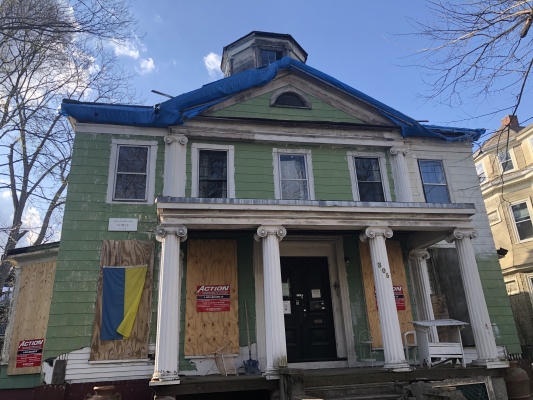
24 May 2021 A path to preserving the Fowle-Davis House in Jamaica Plain
Historic Boston Inc. is examining the history and condition of the Fowle-Davis House at 305 Chestnut Avenue in Jamaica Plain for ways to preserve the very distressed Greek Revival period house. The house has fallen into serious disrepair and, at present, faces possible action in Boston Housing Court by the City of Boston.
Thought to date to 1841, 305 Chestnut Street is an unusual surviving Greek Revival style house for Jamaica Plain and Boston. It was built by John D. Fowle of Roxbury, a ship carver who, with his brother William, was trained in his father Isaac’s wood carving shop. The Fowle family’s workshops were on Ship Street in the North End and Commercial Street in Boston. John’s best known work was a masthead of President Andrew Jackson carved for the US Constitution (Old Ironsides) in the 1840s to replace an earlier version of the president that had been decapitated by opponents of Jacksonian politics.
Fowle sold his property in 1863 to J.Alba Davis, a hide and leather dealer. Once part of a much larger farm with barn and pond, the Fowle-Davis House was moved by Davis sometime before 1874. Davis moved the house closer to Chestnut Avenue so that the farmlands could be subdivided into house lots for the suburbanizing city, creating the neighborhood of Victorian houses surround it today.
Neighbors to the house at 305 Chestnut Street have been organizing to protect the house from demolition or inappropriate development. Historic Boston is evaluating strategies for protecting the house until a more comprehensive restoration and rehabilitation can be undertaken.



